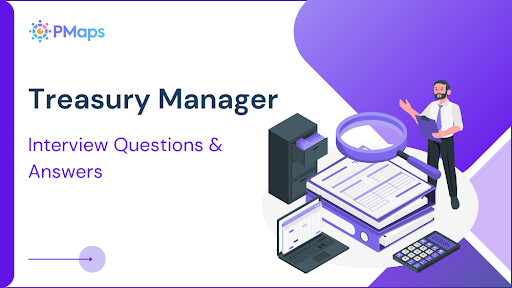
Treasury manager interview questions are crucial for evaluating candidates’ ability to manage an organization’s liquidity, cash flow, and financial risk. Treasury managers play a key role in ensuring effective cash management, investment strategy, and regulatory compliance, making their analytical, strategic, and decision-making skills essential.
This guide provides comprehensive treasury manager interview questions and answers, covering general, behavioral, situational, and technical areas. Each question highlights what it assesses, what interviewers should listen for, and a sample ideal answer—helping hiring managers identify candidates who can optimize treasury operations while maintaining financial stability and regulatory compliance.
General Interview Questions for Treasury Manager
General treasury manager interview questions assess a candidate’s knowledge of financial management, cash flow, risk mitigation, and compliance. These treasury manager questions and answers help determine whether the candidate is equipped to manage financial resources, optimize cash flow, and maintain strong compliance practices. Questions for treasury manager interview roles also evaluate problem-solving abilities, communication skills, and attention to detail.
1. What do you consider to be the key responsibilities of a treasury manager?
- What it assesses:
Understanding of the role’s scope and responsibilities. - What to listen for:
Knowledge of cash management, investment strategies, and risk mitigation. - Sample ideal answer:
“A treasury manager oversees cash flow, manages liquidity, optimizes investments, mitigates financial risks, and ensures compliance with financial regulations. They also provide regular reports to senior management on cash positions, working capital, and financial strategies.”
2. How do you manage cash flow to ensure the organization has sufficient liquidity?
- What it assesses:
Cash flow management and forecasting skills. - What to listen for:
Methods for predicting cash inflows and outflows, as well as maintaining liquidity. - Sample ideal answer:
“I maintain regular cash flow forecasts, monitoring daily balances, and assessing short-term and long-term liquidity requirements. I ensure that sufficient cash reserves are available for operational needs and optimize the organization’s cash position through efficient management of working capital.”
3. How do you evaluate the financial risks associated with investments and cash management?
- What it assesses:
Risk management and investment evaluation. - What to listen for:
Use of risk assessment tools, diversification strategies, and financial performance metrics. - Sample ideal answer:
“I assess financial risks by conducting scenario analysis, reviewing market trends, and evaluating potential returns. I ensure diversification across investment portfolios to mitigate risk and use financial ratios and stress testing to assess risk exposure.”
4. How do you ensure compliance with regulatory requirements and internal financial controls?
- What it assesses:
Knowledge of regulatory standards and compliance management. - What to listen for:
Experience with internal controls, audits, and regulatory standards (e.g., SOX, IFRS). - Sample ideal answer:
“I ensure compliance by regularly reviewing and updating internal financial controls, conducting audits, and staying informed about regulatory changes. I also ensure that all treasury operations adhere to legal and ethical standards and maintain transparency in all financial transactions.”
5. How do you report financial data and provide insights to senior management?
- What it assesses:
Communication and reporting skills. - What to listen for:
Ability to prepare clear, accurate reports and offer actionable financial insights. - Sample ideal answer:
“I prepare regular financial reports that include key metrics, such as cash balances, liquidity status, and investment performance. I provide senior management with actionable insights, highlighting potential risks and opportunities, and support strategic decision-making with detailed financial analysis.”
Behavioral Interview Questions for Treasury Manager
Behavioral treasury manager interview questions and answers explore how candidates have handled real-world challenges in past roles. These treasury manager behavioral questions reveal leadership, decision-making, risk management, and problem-solving abilities—critical traits for managing an organization’s treasury effectively.
1. Tell me about a time you identified a financial risk and mitigated it.
- What it assesses:
Risk awareness, problem-solving, and initiative. - What to listen for:
Steps taken to identify, analyze, and address the risk effectively. - Sample ideal answer:
“I noticed a significant exposure to foreign currency fluctuations. I proposed a hedging strategy using forward contracts, presented the plan to management, and successfully reduced potential losses while maintaining liquidity.”
2. Describe a situation where you improved a treasury process.
- What it assesses:
Process improvement and analytical skills. - What to listen for:
Implementation of new procedures or optimization strategies. - Sample ideal answer:
“I implemented an automated cash forecasting system that consolidated data from multiple accounts. This reduced errors, improved reporting accuracy, and allowed the team to make faster decisions on liquidity management.”
3. Give an example of how you managed a high-pressure financial situation.
- What it assesses:
Stress management, decision-making, and strategic thinking. - What to listen for:
Ability to maintain composure and make informed decisions under pressure. - Sample ideal answer:
“During a sudden liquidity shortage, I quickly analyzed cash positions, coordinated with banks for short-term financing, and prioritized payments. This ensured operations continued smoothly without penalties or delays.”
4. Tell me about a time you had to collaborate with other departments to achieve a financial goal.
- What it assesses:
Teamwork, communication, and cross-functional collaboration. - What to listen for:
Examples of working effectively with finance, operations, or management teams. - Sample ideal answer:
“I worked with operations and finance teams to optimize working capital. We implemented improved payment schedules and inventory management, which freed up cash and improved liquidity without impacting operations.”
5. Describe a situation where you had to ensure compliance under tight deadlines.
- What it assesses:
Compliance awareness, time management, and accuracy. - What to listen for:
Ability to maintain compliance while meeting deadlines. - Sample ideal answer:
“During month-end reporting, I identified last-minute regulatory changes. I quickly updated reports, coordinated with auditors, and ensured all submissions were accurate and compliant within the deadline.”
Situational Interview Questions for Treasury Manager
Situational treasury manager interview questions are designed to evaluate how candidates would handle specific, real-world scenarios they might encounter in their role. These treasury manager scenario-based questions help assess decision-making, problem-solving, and the ability to stay calm under pressure.
1. How would you manage a sudden shortfall in cash reserves during a critical business cycle?
- What it assesses:
Crisis management, cash flow management, and problem-solving. - What to listen for:
Quick thinking, resourcefulness, and ability to ensure business continuity. - Sample ideal answer:
“I would first assess the cash flow situation by reviewing accounts payable and receivable. I’d then explore temporary financing options, such as short-term loans or credit lines, while negotiating with vendors to extend payment terms. I would also prioritize essential expenses to ensure continuity without jeopardizing financial stability.”
2. What steps would you take if you discovered an investment you made didn’t meet the expected returns?
- What it assesses:
Risk evaluation, decision-making, and adaptability. - What to listen for:
Evaluation of the situation, corrective actions, and communication with senior management. - Sample ideal answer:
“I would conduct a thorough review of the investment to identify the cause of the underperformance. If necessary, I would recommend reallocating funds to a more suitable option and communicate the changes with senior management. I would also implement more robust performance tracking moving forward.”
3. How would you handle a situation where a key supplier demands early payment, but it could affect your liquidity?
- What it assesses:
Negotiation skills, financial planning, and stakeholder management. - What to listen for:
Creative solutions to manage both the supplier’s needs and the organization’s cash flow. - Sample ideal answer:
“I would review our current cash flow to see if there is any flexibility. If not, I’d negotiate a compromise, such as partial payment upfront and the rest later, or offer an alternative benefit like early payment discounts in return for extending the payment terms. The goal is to maintain a good relationship while safeguarding liquidity.”
4. How would you respond to a regulatory change that could significantly impact the organization’s cash management strategy?
- What it assesses:
Regulatory awareness, adaptability, and strategic decision-making. - What to listen for:
A clear plan to assess the impact, communicate the change, and implement adjustments. - Sample ideal answer:
“I would assess the impact of the regulatory change on our current strategy and consult with legal and compliance teams to ensure we’re aligned with the new requirements. I’d then revise our cash management strategies, communicate the changes to relevant departments, and monitor the impact to ensure we remain compliant while optimizing cash flow.”
Technical / Role-Specific Interview Questions for Treasury Manager
Technical treasury manager interview questions assess a candidate’s proficiency in managing cash, investments, liquidity, and financial risk. These treasury manager role-specific questions ensure that the candidate can effectively apply their technical knowledge to support the organization’s financial health, manage financial risks, and comply with relevant regulations.
1. What experience do you have with cash flow forecasting and liquidity management?
- What it assesses:
Cash flow management and forecasting skills. - What to listen for:
Experience in forecasting tools, methods, and how the candidate manages liquidity to ensure business operations. - Sample ideal answer:
“I use cash flow forecasting models to predict future liquidity needs, considering historical data and upcoming expenses. I regularly monitor daily cash balances and adjust forecasts as needed to ensure there is enough cash available for operations. I also collaborate with departments to align cash management with the company’s strategic goals.”
2. How do you manage investment portfolios to balance risk and return?
- What it assesses:
Investment management, risk assessment, and financial analysis. - What to listen for:
Risk mitigation strategies, use of diversification, and understanding of investment principles. - Sample ideal answer:
“I ensure that the investment portfolio is diversified across different asset classes to balance risk and return. I assess each investment’s risk profile and potential returns, and I make adjustments based on market conditions, company liquidity needs, and the overall economic environment.”
3. How do you use financial models in your role as a treasury manager?
- What it assesses:
Knowledge of financial modeling and its application in treasury operations. - What to listen for:
Use of financial models for forecasting, risk management, and decision-making. - Sample ideal answer:
“I use financial models to forecast cash flow, project future funding needs, and assess the impact of potential investment opportunities. I also create models to evaluate liquidity, measure the cost of capital, and calculate the optimal mix of short-term and long-term financing.”
4. What steps do you follow to ensure compliance with treasury regulations and internal controls?
- What it assesses:
Regulatory compliance and internal control knowledge. - What to listen for:
Experience in applying and monitoring regulatory guidelines and internal controls. - Sample ideal answer:
“I ensure compliance by regularly reviewing treasury operations, following up on audit results, and staying informed about regulatory changes. I also implement and monitor internal controls to prevent errors and mitigate financial risks. Regular training for the team ensures compliance across all treasury operations.”
5. How do you handle foreign exchange risk and hedging strategies?
- What it assesses:
Foreign exchange (FX) management and hedging expertise. - What to listen for:
Knowledge of FX exposure, hedging techniques, and how they apply to treasury operations. - Sample ideal answer:
“I monitor foreign exchange exposure regularly and use hedging strategies like forward contracts or options to mitigate risks. I work closely with the finance team to understand the company’s FX needs and design hedging strategies that align with our risk appetite and financial goals.”
Pro Tips for Interviewing Treasury Managers
While treasury manager interview questions evaluate a candidate’s technical and operational expertise, the interview process should also assess their ability to think strategically, manage risks, and provide insightful financial analysis. Here are some practical treasury manager interview tips to help recruiters make more informed hiring decisions:
Assess strategic thinking and problem-solving skills:
Treasury managers need to make decisions that impact the company’s financial stability. Ask candidates to describe scenarios where they’ve identified financial risks and taken proactive steps to mitigate them.
Evaluate financial decision-making and prioritization:
Candidates should be able to explain how they prioritize liquidity needs versus long-term investments. Ask about their experience in balancing immediate cash flow requirements with long-term financial strategies.
Assess understanding of financial regulations and compliance:
Treasury managers must ensure compliance with local and international financial regulations. Ask candidates about their experience with regulatory requirements and internal controls, especially in areas such as cash management and financial reporting.
Inquire about their approach to risk management:
Ask candidates to describe how they identify, assess, and mitigate financial risks, including foreign exchange risk, credit risk, and liquidity risk. Candidates should show a methodical approach to managing risk.
Use assessments to validate skills:
Pair interviews with a structured Treasury Manager Test to evaluate the candidate’s knowledge of financial regulations, risk management, and treasury processes. This helps validate the candidate’s technical skills before making a final decision.
Conclusion
A structured set of treasury manager interview questions allows hiring managers to evaluate a candidate’s technical knowledge, strategic thinking, and risk management skills. By combining general, behavioral, situational, and technical questions, you can gain a comprehensive understanding of a candidate’s ability to manage the treasury function effectively and contribute to the organization’s financial stability.
For a detailed breakdown of responsibilities and requirements, refer to our Treasury Manager Job Description. To assess technical skills before the interview, explore the Treasury Manager Test.









